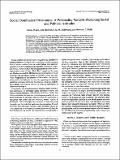Social Dominance Orientation: A Personality Variable Predicting Social and Political Attitudes

View/
Published Version
https://doi.org/10.1037/0022-3514.67.4.741Metadata
Show full item recordCitation
Pratto, Felicia, James Sidanius, Lisa M. Stallworth, and Bertram F. Malle. 1994. Social dominance orientation: A personality variable predicting social and political attitudes. Journal of Personality and Social Psychology 67, no. 4: 741-763.Abstract
Social dominance orientation (SDO), one's degree of preference for inequality among social groups, is introduced. On the basis of social dominance theory, it is shown that (a) men are more social dominance-oriented than women, (b) high-SDO people seek hierarchy-enhancing professional roles and low-SDO people seek hierarchy-attenuating roles, (c) SDO was related to beliefs in a large number of social and political ideologies that support group-based hierarchy (e.g., meritocracy and racism) and to support for policies that have implications for intergroup relations (e.g., war, civil rights, and social programs), including new policies. SDO was distinguished from interpersonal dominance, conservatism, and authoritariansim. SDO was negatively correlated with empathy, tolerance, communality, and altruism. The ramifications of SDO in social context are discussed.Terms of Use
This article is made available under the terms and conditions applicable to Other Posted Material, as set forth at http://nrs.harvard.edu/urn-3:HUL.InstRepos:dash.current.terms-of-use#LAACitable link to this page
http://nrs.harvard.edu/urn-3:HUL.InstRepos:3207711
Collections
- FAS Scholarly Articles [18292]
Contact administrator regarding this item (to report mistakes or request changes)


